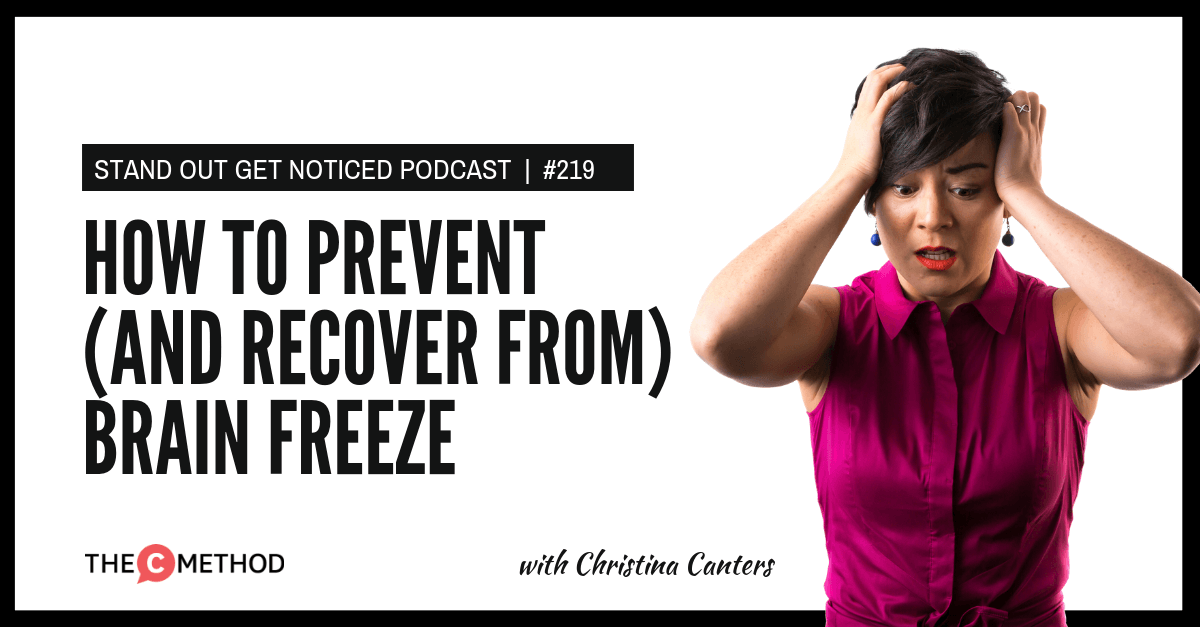The C Method Academy is launching in October 2019! Get on the waitlist and be first to be notified and receive early bird membership discounts. Click here for more information and to join the waitlist.
Have you ever stood up to speak and gone completely blank?
Or perhaps you sat back down again and thought: ‘I have no idea what I just said…’?
It’s OK. Experiencing ‘brain freeze’ has happened to ALL of us. I guarantee it. Whenever I ask an audience “Who here has ever gone blank when public speaking?” every single person raises their hand. So if you’re thinking “I thought it was just me!”, then please know you are not alone.
In this podcast, I share WHY our brain freezes up and goes blank, and how to avoid it. You’ll discover two really simple techniques to help you to stay calm, grounded and connected to the audience. If you practice these techniques (and they do work), not only will it help you speak with clarity, ease and flow, you will also FEEL more courageous and confident going in to speaking engagements or high pressure meetings, because you KNOW you got this.
Why do we freeze up in the first place?
There is a part of the brain called the periaqueductal grey (PAG), which is responsible for dictating how we (humans and animals) respond to perceived danger. The PAG receives various inputs about potential threats (for example: loud barking dogs, the edge of a cliff, a group of people looking at us) and triggers an automatic reflexive response that can cause us to either freeze in place, give us the bloodflow to run away (flight), or the adrenaline rush to fight. (See here for more science about the PAG)
When we stand up to speak, our primal croc brain is the first to react. This is the part of our brain that is responsible for primal urges such as keeping us safe. And of course, it thinks we are in grave danger. ‘Oh no!’ it thinks. ‘Don’t mess up! They will see you’re no good at your job! Which means you’ll be rejected from the tribe! Which means you’ll be cast out into the dark to be eaten by bears!’
(Of course, for most of us, this isn’t actually going to happen, but the croc brain doesn’t know that, as it can’t differentiate between life-threatening fear and potential humiliation-inducing fear)
So, the PAG responds to the croc brain, and one of the responses is for us to freeze in place. It also starts to pump blood to areas required to fight or run away, like our arms and legs. We also start to breath shorter breaths, and even hold our breath.
And when we hold our breath, we restrict the amount of oxygen flow to the brain. And when there is no blood and oxygen in the brain, we can’t think clearly, and as a result, we forget what we’re saying and we go blank. In other cases, our mind ‘flies’ away and we lose connection with our ourselves, our message and our audience. You can see when someone loses connection with themselves – their eyes often gaze blankly to the back of the room, or they dart around without actually ‘seeing’ the audience.
How do we prevent brain freeze?
Now that we know what causes us to freeze up, our goal is to bring more oxygen to the brain to help you think clearer, and to bring yourself into a present state so you remain connected to yourself.
In the podcast, I share a simple breathing exercise you can do to reduce anxiety and create more oxygen flow to the brain. It’s called ‘box breathing’ and it looks like this:
- Breath in slowly for 4 counts
- Hold at the top for 4 counts
- Breath out for 4 counts
- Hold at the bottom for 4 counts
Repeat this 10 times. Make sure you breathe into your diaphragm (your lower belly) and NOT your chest.
**Also make sure you check out my podcast ‘How to Answer Q&A Like a Ninja‘ for more techniques on speaking impromptu – even if you don’t know the answer.

Leave a Reply